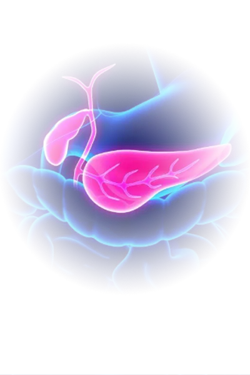

Overview of Pancreatic Cysts and Their Role in Pancreatic Cancer Diagnosis
If you have recently been diagnosed with a pancreatic cyst, you are not alone. There are several types of pancreatic cysts, so it is important to know what type you have to help you and your doctor make informed health decisions.
Pancreatic cyst molecular testing with PancraGen™ is one of the ways your doctor can learn more information about your cyst and decide upon the course of action that may be right for you.
What do I need to know about pancreatic cysts?
Pancreatic cysts become more common as people age; many people over 70 years of age have pancreatic cysts. However, they are sometimes found in younger people.
There are several types of pancreatic cysts. It is important to know what type of cyst you have, as some may be more likely to develop into cancer than others. The good news is that up to 98% of pancreatic cysts turn out to be benign (non-cancerous), and up to 80% of pancreatic cyst surgeries reveal benign results.
- Serous cysts are almost always benign and most do not require treatment unless they grow large or cause symptoms.
- Mucinous cysts are slow-growing tumors that can progress to cancer. Depending on their size, growth, and appearance, surgical removal may be recommended.
- Intraductal papillary mucinous neoplasms (IPMNs) are mostly benign tumors that grow in the pancreatic ducts. They can become cancerous.
How do you determine if a pancreatic cyst is benign (non-cancerous) or malignant (cancerous)?
There are several clinical tests currently performed to assess the likelihood of a pancreatic cyst progressing to cancer. Your doctor can determine which test is most appropriate for you. One way to remove a pancreatic cyst is a surgery called the Whipple procedure, in which the head of the pancreas, gallbladder, part of the bile duct, part of the small intestine, and sometimes part of the stomach is removed. There are also other types of surgery, such as a distal pancreatectomy, in which the body and/or tail of the pancreas and the spleen are removed. However, up to 80% of surgeries for pancreatic cysts have been shown to be unnecessary.
Molecular Testing of Pancreatic Cysts
Pancreatic cyst molecular testing with PancraGen™ is one of the most advanced diagnostic tests for pancreatic cysts available today. This specialized test combines molecular analysis with other clinical test results to assess the likelihood that a pancreatic cyst is cancerous. By looking at the “molecular level” of genes and proteins in the fluid of the cyst, scientists can more confidently assess whether a cyst carries the risk for turning into cancer.
PancraGen™ has an accuracy level of 90%. Because 80% of surgeries for pancreatic cysts may not be necessary, PancraGen™ can provide greater confidence if you are faced with the decision of having surgery or continued follow-up by your doctor. Your doctor can determine if this test is appropriate for you.








